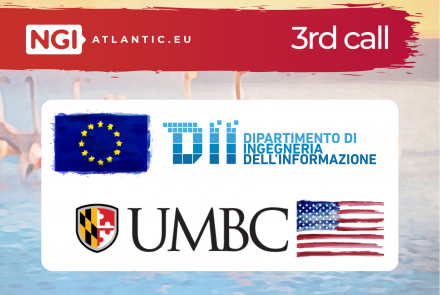The NGIAtlantic.eu project has ended in February 2023. For the follow-up initiative, visit NGI Transoceanic.

Project Coordinator (EU) :
Ca’ Foscari University of Venice (UniVe)Country of the EU Coordinator :
ItalyOrganisation Type :
AcademiaStarting date :
Open and Resilient Radio Access Network for Next Generation Wireless Backhauls
Open Internet Architecture and Renovation
This project aims at merging the data-based network design carried on by the University of Venice (Italy) with the advanced experimental facilities by Northeastern University (USA) to study the backhaul network of 5G and beyond, which will radically change compared to previous generations of mobile networks. We will produce scientific results, open source code, and open data that will contribute to shape this research field in the years to come.

Project Coordinator (EU) :
Politecnico di TorinoCountry of the EU Coordinator :
ItalyOrganisation Type :
AcademiaStarting date :
Distributed Learning for Resilient Virtual Network Management at Scale
Open Internet Architecture and Renovation
In this project we aim at investigating and experimenting with algorithmic and system solutions that efficiently allow the distribution of multi-agent network models for self-scaling and resilient Next Generation networks. This project will benefit from the collaboration between EU (Politecnico di Torino, POLITO)
and US (Saint Louis University, SLU) partners. POLITO will mainly contribute to the design and implementation of the required user interfaces, while SLU will offer its experience in NSF-funded large-scale testbeds such as Chameleon Cloud and GENI.

Project Coordinator (EU) :
Sapienza University of RomeCountry of the EU Coordinator :
ItalyOrganisation Type :
AcademiaStarting date :
Vulnerability Assessment and Robust Defenses for Optimized Attacks in Dynamic SDNs Experiment
Strengthening Trustworthiness and Resilience Of the Internet
Software-Defined Networking (SDN) has fundamentally improved the observability and controllability of computer networks through its logically centralized control plane architecture. However, this new architecture also exposes new attack surfaces due to the heavy interdependency between the centralized control plane and the distributed data plane. The primary objective of this project is to quantify the vulnerability of SDN to intelligent host-based adversaries, with a secondary objective of developing defenses by improving the inherent robustness of the network.
In particular, the US partner team, led by Prof. Ting He, will carry out experiments on understanding the vulnerabilities of these networks to cache pollutions attacks. The EU team, led by Prof. Novella Bartolini and Dr. Viviana Arrigoni, will consider a network subject to the aforementioned vulnerabilities, where the cache attacks cause either anomalously high congestion or software failures.

Project Coordinator (EU) :
Department of Information Engineering - University of PisaCountry of the EU Coordinator :
ItalyOrganisation Type :
AcademiaStarting date :
EdgeFlooding: Exploiting Edge computing for Real-Time Monitoring and Detection of Flash Floods
Decentralised data governance - experimentation of results
Flash flood monitoring systems for just-in-time notification of flooding events will be crucial to secure any city located in prone flood areas. For this reason, an experimental implementation of a flood monitoring system has been developed at the University of Maryland, Baltimore County (UMBC). The EdgeFlooding project aims at extending this system, which adopts a centralized cloud-based approach, to create a novel implementation that adopts a distributed approach based on edge/cloud computing.
The extension will be carried out by the University of Pisa (UNIPI) with the support of UMBC. In order to assess the performance of such system, an extensive experimentation will be carried out by UNIPI on two European Fed4Fire+ testbeds, one, Virtual Wall, hosted at and managed by imec IDLabt ilab.t in Ghent, the other, Grid’5000, managed by a scientific interest group (GIS) and hosted by Inria. The aim of those experiments is to assess whether a distributed edge/cloud computing approach is feasible for the implementation of future environmental monitoring systems.
